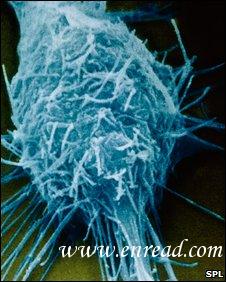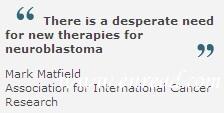| ||||||||||||||||||||||||||||||||||||||||||||||||||||||||||||||||||||||||
|
Scientists believe they may have found a way to treat a type of childhood cancer of the nervous system. 科学家们认为他们已经找到一种治疗儿童时期就患的性质严重的癌症的方法。 Neuroblastoma is caused by a build up of a protein Neuroblastoma(成神经细胞瘤) accounts for around 7% of all childhood cancers, and around one in six cancer deaths in children. Research by a German team suggests blocking the activity of a protein called Aurora1(黎明的女神,北极光) may turn cancerous cells back into a non-malignant(恶性的,有害的) state. The study, published in the journal Cancer Cell, raises hopes of new drugs to treat the condition. Neuroblastoma, found most commonly in children under the age of five, is a cancer of specialised nerve cells, called neural2 crest3(神经嵴) cells. These cells are involved in the development of the nervous system and other tissues. Tumours4(肿瘤) often develop in one of the adrenal(肾上腺) glands5(腺体), but may also form in nerve tissues in the neck, chest, abdomen6(腹部), or pelvis(骨盘). The most aggressive forms are fuelled by the build up of a protein called Myc in the cells. Reversing(回动的) build up A team at the University of Marburg in Germany found that Aurora stops cells from destroying the Myc protein, causing a build-up which makes the cells cancerous. They believe that inhibiting7(铠装) Aurora's activity would allow Myc to break down normally. In theory this would mean that cancerous cells would revert8 to a healthy state. Lead researcher Professor Martin Eilers said: "We are very excited by our findings which may pave the way for the development of drugs to fight this rare but deadly cancer." Mark Matfield, of the Association for International Cancer Research, which funded the study, stressed the research was at an early stage. But he said: "This is an important development - there is a desperate need for new therapies(疗法,治疗) for neuroblastoma. "It is one of the most difficult childhood cancers to treat successfully." Dr Penelope Brook9, a child cancer specialist at London's Great Ormond Street Hospital, said the research was a "potentially very exciting" development in the treatment of what could be a "very worrying" disease. However, she said: "There are a number of new potential treatments coming through for neuroblastoma, but it will not be until clinical(临床的) trials have been carried out that we will know which one will be of most use. "Sometimes treatments appear very active in cell cultures, or even animal models, but sadly they do not translate into improvements in clinical outcomes." 点击  收听单词发音 收听单词发音
|
||||||||||||||||||||||||||||||||||||||||||||||||||||||||||||||||||||||||
- 发表评论
-
- 最新评论 进入详细评论页>>





